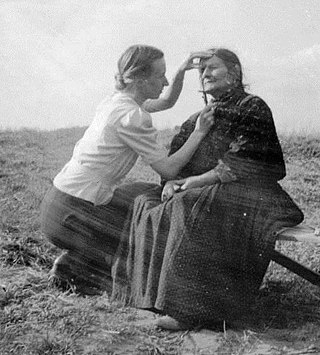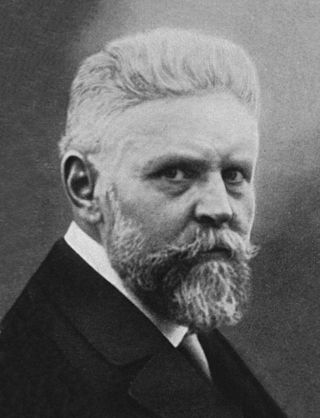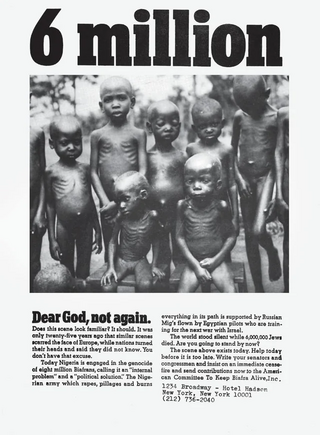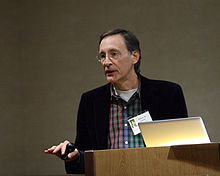The Aryan race is an obsolete historical race concept that emerged in the late-19th century to describe people who descend from the Proto-Indo-Europeans as a racial grouping. The terminology derives from the historical usage of Aryan, used by modern Indo-Iranians as an epithet of "noble". Anthropological, historical, and archaeological evidence does not support the validity of this concept.

The racial policy of Nazi Germany was a set of policies and laws implemented in Nazi Germany under the dictatorship of Adolf Hitler, based on pseudoscientific and racist doctrines asserting the superiority of the putative "Aryan race", which claimed scientific legitimacy. This was combined with a eugenics program that aimed for "racial hygiene" by compulsory sterilization and extermination of those who they saw as Untermenschen ("sub-humans"), which culminated in the Holocaust.

Primatology is the scientific study of primates. It is a diverse discipline at the boundary between mammalogy and anthropology, and researchers can be found in academic departments of anatomy, anthropology, biology, medicine, psychology, veterinary sciences and zoology, as well as in animal sanctuaries, biomedical research facilities, museums and zoos. Primatologists study both living and extinct primates in their natural habitats and in laboratories by conducting field studies and experiments in order to understand aspects of their evolution and behavior.

Eugen Fischer was a German professor of medicine, anthropology, and eugenics, and a member of the Nazi Party. He served as director of the Kaiser Wilhelm Institute of Anthropology, Human Heredity, and Eugenics, and also served as rector of the Frederick William University of Berlin.

The Kaiser Wilhelm Institute of Anthropology, Human Heredity, and Eugenics was founded in 1927 in Berlin, Germany. The Rockefeller Foundation partially funded the actual building of the Institute and helped keep the Institute afloat during the Great Depression.
Darrell Huff was an American writer, and is best known as the author of How to Lie with Statistics (1954), the best-selling statistics book of the second half of the twentieth century.

The term racial hygiene was used to describe an approach to eugenics in the early 20th century, which found its most extensive implementation in Nazi Germany. It was marked by efforts to avoid miscegenation, analogous to an animal breeder seeking purebred animals. This was often motivated by the belief in the existence of a racial hierarchy and the related fear that "lower races" would "contaminate" a "higher" one. As with most eugenicists at the time, racial hygienists believed that the lack of eugenics would lead to rapid social degeneration, the decline of civilization by the spread of inferior characteristics.

Otmar Freiherr von Verschuer was a German-Dutch human biologist and geneticist, who was the Professor of Human Genetics at the University of Münster until he retired in 1965. A member of the Dutch noble Verschuer family, his title Freiherr is often translated as baron.

Nazi analogies or Nazi comparisons are any comparisons or parallels which are related to Nazism or Nazi Germany, which often reference Adolf Hitler, Joseph Goebbels, the SS, or the Holocaust. Despite criticism, such comparisons have been employed for a wide variety of reasons since Hitler's rise to power. Some Nazi comparisons are logical fallacies, such as reductio ad Hitlerum. Godwin's law asserts that a Nazi analogy is increasingly likely the longer an internet discussion continues; Mike Godwin also stated that not all Nazi comparisons are invalid.

Erbkrank is a 1936 Nazi propaganda film directed by Herbert Gerdes.

Londa Schiebinger is the John L. Hinds Professor of History of Science, Department of History, and by courtesy the d-school, Stanford University. She received her Ph.D. from Harvard University in 1984. An international authority on the theory, practice, and history of gender and intersectionality in science, technology, and medicine, she is the founding Director of Gendered Innovations in Science, Medicine, Engineering, and Environment. She is an elected member of the American Academy of Arts and Sciences. Schiebinger received honorary doctorates from the Vrije Universiteit Brussel, Belgium (2013), from the Faculty of Science, Lund University, Sweden (2017), and from Universitat de València, Spain (2018). She was the first woman in the field of History to win the prestigious Alexander von Humboldt Research Prize in 1999.

Nazi eugenics refers to the social policies of eugenics in Nazi Germany, composed of various ideas about genetics. The racial ideology of Nazism placed the biological improvement of the German people by selective breeding of "Nordic" or "Aryan" traits at its center. These policies were used to justify the involuntary sterilization and mass-murder of those deemed "undesirable".

Within the sociology of knowledge, agnotology is the study of deliberate, culturally induced ignorance or doubt, typically to sell a product, influence opinion, or win favour, particularly through the publication of inaccurate or misleading scientific data (disinformation). More generally, the term includes the condition where more knowledge of a subject creates greater uncertainty.

Otto Carl Reche was a German anthropologist and professor from Glatz (Kłodzko), Prussian Silesia. He was active in researching whether there was a correlation between blood types and race. During the Second World War he openly advocated the genocide of ethnic Poles. Once a member of the Nazi Party, he remained active in anthropological issues following the downfall of Nazi Germany.

In the early 20th century, German researchers found additional evidence linking smoking to health harms, which strengthened the anti-tobacco movement in the Weimar Republic and led to a state-supported anti-smoking campaign. Early anti-tobacco movements grew in many nations from the middle of the 20th century. The 1933–1945 anti-tobacco campaigns in Nazi Germany have been widely publicized, although stronger laws than those passed in Germany were passed in some American states, the UK, and elsewhere between 1890 and 1930. After 1941, anti-tobacco campaigns were restricted by the Nazi government.
Iain Boal is an Irish social historian of technics and the commons, based as an independent scholar in Berkeley, California and London.

Merchants of Doubt: How a Handful of Scientists Obscured the Truth on Issues from Tobacco Smoke to Global Warming is a 2010 non-fiction book by American historians of science Naomi Oreskes and Erik M. Conway. It identifies parallels between the global warming controversy and earlier controversies over tobacco smoking, acid rain, DDT, and the hole in the ozone layer. Oreskes and Conway write that in each case "keeping the controversy alive" by spreading doubt and confusion after a scientific consensus had been reached was the basic strategy of those opposing action. In particular, they show that Fred Seitz, Fred Singer, and a few other contrarian scientists joined forces with conservative think tanks and private corporations to challenge the scientific consensus on many contemporary issues.
Feminist biology is an approach to biology that is concerned with the influence of gender values, the removal of gender bias, and the understanding of the overall role of social values in biological research and practices. Feminist biology was founded by, among others, Dr. Ruth Bleier of the University of Wisconsin-Madison. It aims to enhance biology by incorporating feminist critique in matters varying from the mechanisms of cell biology and sex selection to the assessment of the meaning of words such as "gender" and "sex". Overall, the field is broadly defined and pertains itself to philosophies behind both biological and feminist practice. These considerations make feminist biology debatable and conflictive with itself, particularly when concerning matters of biological determinism, whereby descriptive sex terms of male and female are intrinsically confining, or extreme postmodernism, whereby the body is viewed more as a social construct. Despite opinions ranging from determinist to postmodernist, however, biologists, feminists, and feminist biologists of varying labels alike have made claims to the utility of applying feminist ideology to biological practice and procedure.

Angela N. H. Creager is a biochemist, historian of science, and the Thomas M. Siebel Professor in the History of Science at Princeton University, where she is also the director of the Shelby Collum Davis Center for Historical Studies. Prior to the Siebel chair's creation in 2015, she was the Philip and Beulah Rollins Professor of History. She served as president of the History of Science Society (HSS) from 2014 to 2015. She focuses on the history of biomedical research in the 20th century. In 2020 she was elected to the American Philosophical Society.

Racial Hygiene: Medicine Under the Nazis is a non-fiction book by American historian Robert N. Proctor, published in 1988 by Harvard University Press. The author explores the German scientific community's role in forming and implementing the racial policies of Nazi Germany. In his study, Proctor analyzes how Nationalsozialistische Rassenhygiene, National Socialist racial hygiene or “Eugenics” was used to justify racial programs and traces the progression of eugenic methods, such as involuntary euthanasia, within Germany. Racial Hygiene generally received positive reviews for its analysis of medical practitioners’ complicity in Nazi racial doctrine.
















